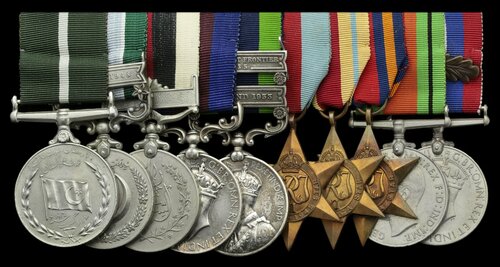
Auction: 21002 - Orders, Decorations and Medals
Lot: 227
A rare North Africa 1942 Escaper's Immediate I.D.S.M. group of ten awarded to Jemadar A. Malik, 3/2nd Punjab Regiment
Pakistan, Independence Medal; General Service Medal, 1 clasp, Kashmir 1948; 23 March 1956 Medal; Indian Distinguished Service Medal, G.VI.R. (10885 Hav Abdul Malik, 3-2 Punjab R); India General Service 1909-35, 2 clasps, Mohmand 1933, North West Frontier 1935 (10885 Sep. Abdul Malik, 3-2 Punjab R.), unofficial rivets between clasps; 1939-45 Star; Africa Star; Burma Star; Defence and War Medal 1939-45, with M.I.D. oak leaves, mounted as worn, contact marks, very fine (10)
Ex-Colonel Sudlow Collection.
I.D.S.M. London Gazette 11 March 1943. The recommendation - for an Immediate award - by the Middle East Representative of M.I.9., the intelligence legend Colonel Dudley Wrangel Clarke, states:
'On 28 June 1942 a column of 3/2 Punjab Regiment was surprised by German tanks and six Officers and 108 men were captured. They were searched that night and all papers, knives and trinkets removed.
Next day at about 1330hrs the British Officers were taken away by the Germans. The rest were taken to Matruh to the old British P/W Camp, where the Indian Officers were then separated from them. A week later they left Matruh and went to Tobruk reaching it the next day.
They were in an enclosure North of El Gubbi L/G till 3 weeks later when they moved to the camp below the escarpment, South of the L/G Gubbi Satellite.
About a week later they left Tobruk to return to Matruh where apparently additional dock labour was needed. They arrived the next day going directly to the camp South of the Egyptian barracks.
On 19 August at 2300hrs Havildar Malik escaped with Lance-Naik Fazal Hussain No.12635, who has been recommended for a Mention. They crawled through the wire on the North side of the camp, ran across to the embankment and hid behind it. They then made their wat down the road to the West, and then South. They used the Pole Star to guide them. They had with them a 2-gallon tin of water, 2 water bottles, 1 chhagal, 1 2lb tin of jam and a haversack full of biscuits.
At 0200hrs on 20 August they had reached the hill South of Matruh. That evening they reached Bir Sidi Hamsa, which Havildar Malik remembered as his Battalion had been there for a time. On the evening of 21 August they ran out of water, but went on South East for two days. On 23 August they reached the Qattara Depression where they found bitter water. For three days they walked on though soft ground, sometimes going in up to their knees. On the fourth day they were on hard ground. On 28 August they were picked up by our troops.
Due to his indomitable courage, which remained unshaken by great hardship, Malik succeeded in escaping and was at the same time responsible for Lance-Naik Hussain's escape. He never once doubted that they would reach our lines, and in addition to this unswerving determination to win through, consciously used his phenomenal powers of visual memory and observation to bring back more military and naval information than any recent escaper.'
Abdul Malik appears to have joined the Indian Army on 31 December 1930, serving in the Mohmand country and on the North West Frontier. Malik, having escaped and won his I.D.S.M., was returned to his unit in Burma. He subsequently earned a 'mention' (London Gazette 9 May 1946, refers) and was commissioned into the Pakistan Army, serving as a Jemadar in the 1st Punjab Regiment; sold together with copied research.
Subject to 20% VAT on Buyer’s Premium. For more information please view Terms and Conditions for Buyers.
Sold for
£8,000
Starting price
£800




